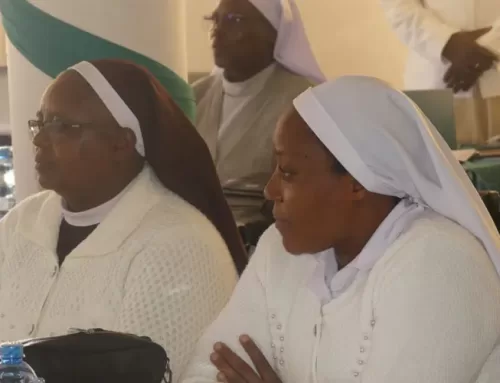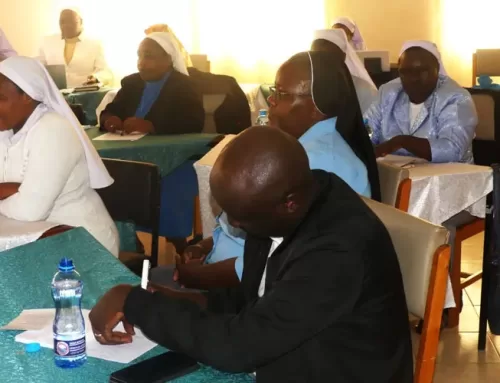Capacity building and incorporating more members are some of the strategies Catholic Sisters in Kenya have undertaken to raise awareness about the need to care for aging women Religious in the East African nation.
In an interview with ACI Africa on the sidelines of a meeting that members of the Care for Aging Sisters Association of Kenya (CASAK) convened to plan for their future activities, the Chairperson of the Board of Management of the Association of Sisterhoods of Kenya (AOSK) from which CASAK members are drawn said that the capacity building initiative has involved gerontology, the study of individuals and their aging processes, including physical, social, and mental changes in them as they age.
Sr. Josephine Kangogo recalled the “knowledge gap” regarding the care for aging women Religious that she said CASAK members had to address upon the establishment of the association in January 2023.
After securing funding from the Conrad N. Hilton Foundation, CASAK leadership identified two Sisters, who were commissioned to the U.S. “to take a short course in gerontology, that is on how to take care of the aged sisters,” Sr. Kangogo told ACI Africa during the Wednesday, April 10 interview at Rosa Mystica Guest House of the Franciscan Sisters of St. Ann (FSSA) in Nairobi, the venue of the CASAK meeting.
“These two Sisters are the ones helping CASAK to create this awareness of the needs of the aged,” she said about the association that so far comprises 22 women Religious Orders that are members of AOSK.
The Kenyan-born member of the Religious Institute of the Daughters of the Sacred Heart (DSH), where she serves as the Provincial Superior of the Eastern Africa Province went on to share about CASAK members’ realization that they “need to train more Sisters in gerontology.”
To achieve this, CASAK members are exploring the possibility of introducing a Certificate Course in gerontology in institutions of higher learning under the auspices of AOSK, Sr. Kangogo said, adding that this will require registering the institutions under Kenya’s Technical and Vocational Education and Training Authority (TVETA).
In an interview with ACI Africa ahead of the April 10 meeting, the Executive Director of CASAK expressed concern that gerontology is not offered in Kenyan institutions of higher learning, despite the high demand for professional caregivers for the elderly in the East African nation.
“I saw one caregiving programme provided by one top university here in Kenya. But it has no single enrollment,” Sr. Agnes Wamuyu said during the April 8 interview.
The Kenyan-born member of the Franciscan Elizabethan Sisters (FES) added, “Caregiving doesn’t seem to be a priority in Kenya. It isn’t prioritized as a career through which one can earn a living and get fulfillment.”
“We need to find ways to make it a desirable profession. We need to have a change of the mindset of young people who shun the course, thinking that it is about being a nanny,” the immediate former AOSK Secretary General said.
“We may have doctors and nurses among us but that doesn’t make them caregivers for the elderly,” Sr. Wamuyu further said, emphasizing the need for professionals among Catholic Sisters to take care of the senior women Religious among them.
In the April 10 interview with ACI Africa, the AOSK Board of Management Chairperson said that CASAK members are hoping that by introducing a “Certificate Course in gerontology, apart from really sharing this knowledge, we might be in a position to also make some money for CASAK” that she said has financial limitations.
“I believe that Sisters have touched the lives of many people in society as teachers, nurses, and social workers and we hope that these people will look at us now and come in as well-wishers,” Sr. Kangogo added.
As part of sustainability initiatives, the Nairobi-based DSH Provincial Superior disclosed that the current 22 CASAK member Institutes of Consecrated Life and Societies of Apostolic Life (ICLSA) “agreed to do annual subscription.”
“We need to think about sustainability beyond the donor funding period,” she said.
Sr. Kangogo also highlighted the need to grow CASAK membership beyond the current 22 member ICLSA as important.
Plans are underway to evaluate CASAK performance in view of scaling up its operations and engaging the more than 120 AOSK member Congregations that are currently not part of CASAK.
CASAK was established following the Centre for Research in Religious Life and Apostolate (CERRA-Africa) investigation into the situation of Catholic Sisters in Kenya, which revealed the urgent need for women Religious in the country to prepare for old age.
The 2020 CERRA-Africa study unearthed the perturbing reality that Catholic women Religious in Kenya hardly prepare for the challenges that come with old age, as well as the amount of caregiving they need as senior citizens.
Thus, CASAK was established as an entity that seeks to consolidate the caregiving efforts of the member ICLSA.






